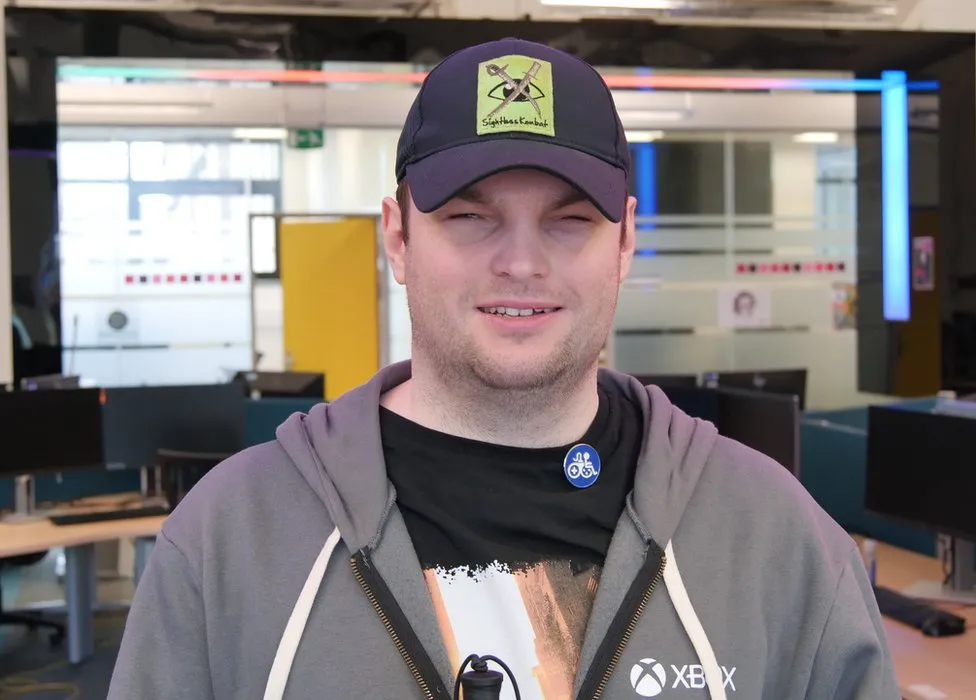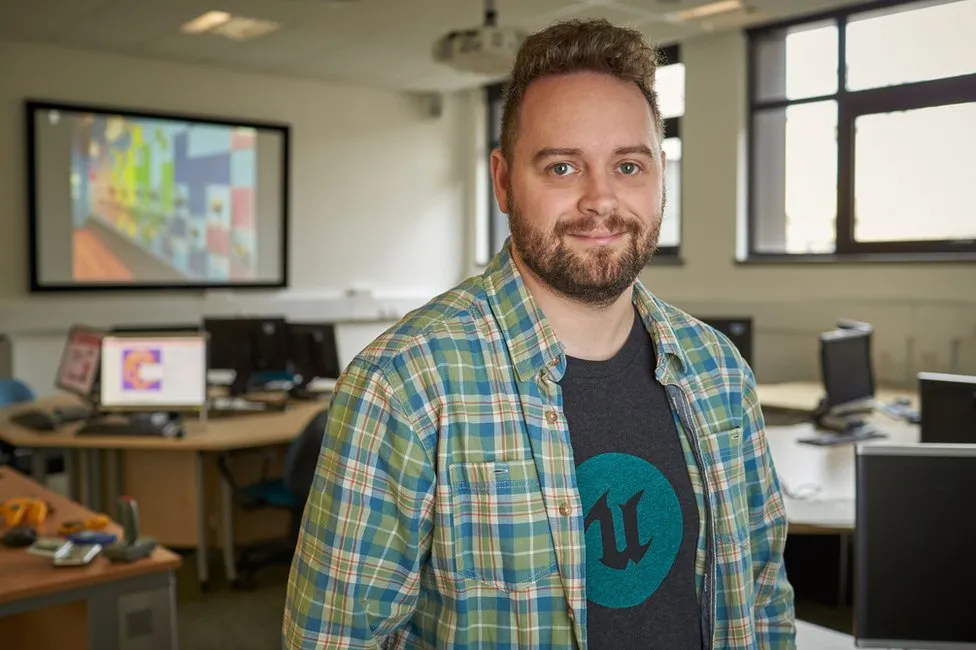
Ben Breen prefers playing games which can be enjoyed by more people
Ben Breen was born without sight but videogames have been part of his life for as long as he can remember.
He started off playing games on his PC without any of the technology that may have helped him understand them.
Since then he has seen more developers add features to games which improve the experience of visually impaired people.
But now he wants to see all big gaming studios consider people with sight loss when developing games.
"I started out with games like Fighter Pilot on PC not really understanding how anything worked because I didn't know about screen readers at the time, or any of the tech," he said.
"So I was just pressing buttons, seeing what happens, and literally nosediving a plane."
He began playing audio games with basic graphics designed for people with low or no vision.
Once developers started adding some features specifically for blind people, Ben was able to play more mainstream games for people of all abilities.
Studios have recently been creating games with more embedded features for those with sight loss, such as The Last Of Us Part 1 for PS5 which was released in September.
"I still do play audio-only games occasionally," Ben said. "But I prefer stuff when it's enjoyable for more people."
Helpful features include creating short-cuts on the handset, and lock-on aim in fighting games.
Screen narration tells the user what is happening visually on the screen, while navigation assistance tools allow the player to determine their distance from objects and enemies.
Now an accessible games and immersive technologies research officer with the Royal National Institute of Blind People (RNIB), Ben is sharing his experiences with the billion-dollar gaming industry.
He was among those at a recent symposium in Dunde who spoke to representatives of Google, EA Games and Microsoft about how videogames could be improved.
The event was hosted by Abertay University - the first in the world to launch a computer games degree - with the RNIB.
By working with the university, Ben hopes future developers will create all of their games with accessibility in mind from the start.
He said: "As much as we've had games released on a couple of platforms that are fully playable, we need to see all the companies stepping up.
"Even just at a basic level, increased accessibility equals increased sales."
Ben added: "Sight loss is a spectrum and gaming can still happen, but more needs to be done in terms of making games accessible.
"Whatever games I can play, I will play."
He said studios need to accept that accessibility is important and he wants to see people with sight loss consulted during the development of games.
"I've had people say to me that they wouldn't want to game if they woke up without sight, but they would," he said.
"You'd want to continue, and the way you're going to be able to continue is if games actually start adding the features in."
Robin Sloan researches games at Abertay

Abertay's Dr Robin Sloan, who has been teaching and researching game design for 15 years, said designing the interactive aspects of games with inclusivity in mind and testing them on people with low or no vision was essential.
"That can be things like using high contrast, larger fonts and less complexity in the scene," he said.
"Beyond that, you get much more challenging things like making decisions around something that's happening that's really visual."
He said standardising design models and codes with accessible features could help smaller games companies improve their inclusivity.
This is because smaller companies often buy in the foundational code for their designs.
"If the model is already accessible, this can allow the developers to just focus on the game," he added.
Adapt games and devices
A spokesperson from the Association for UK Interactive Entertainment, the trade body for the UK games industry, said accessibility was a key priority.
She added: "The UK games industry has a strong track record of working with charities like SpecialEffect to adapt games and devices such as the Microsoft adaptive controller.
"Meanwhile organisations like Many Cats work with studios on a recruitment and culture level to encourage thinking about accessibility at every stage of the development process.
"The games industry equality, diversity and inclusion initiative #RaiseTheGame has worked with the Royal National Institute of Blind People to help provide a perspective on the sector as well as to promote fundraiser and awareness events such as Gaming for RNIB.
"RNIB has consulted with our education initiative Digital Schoolhouse, reviewing materials and providing training on making content accessible for visually impaired learners."
Dundee is a major hub in the industry, launching some of the world's biggest titles including Lemmings and Grand Theft Auto.
From BBC
